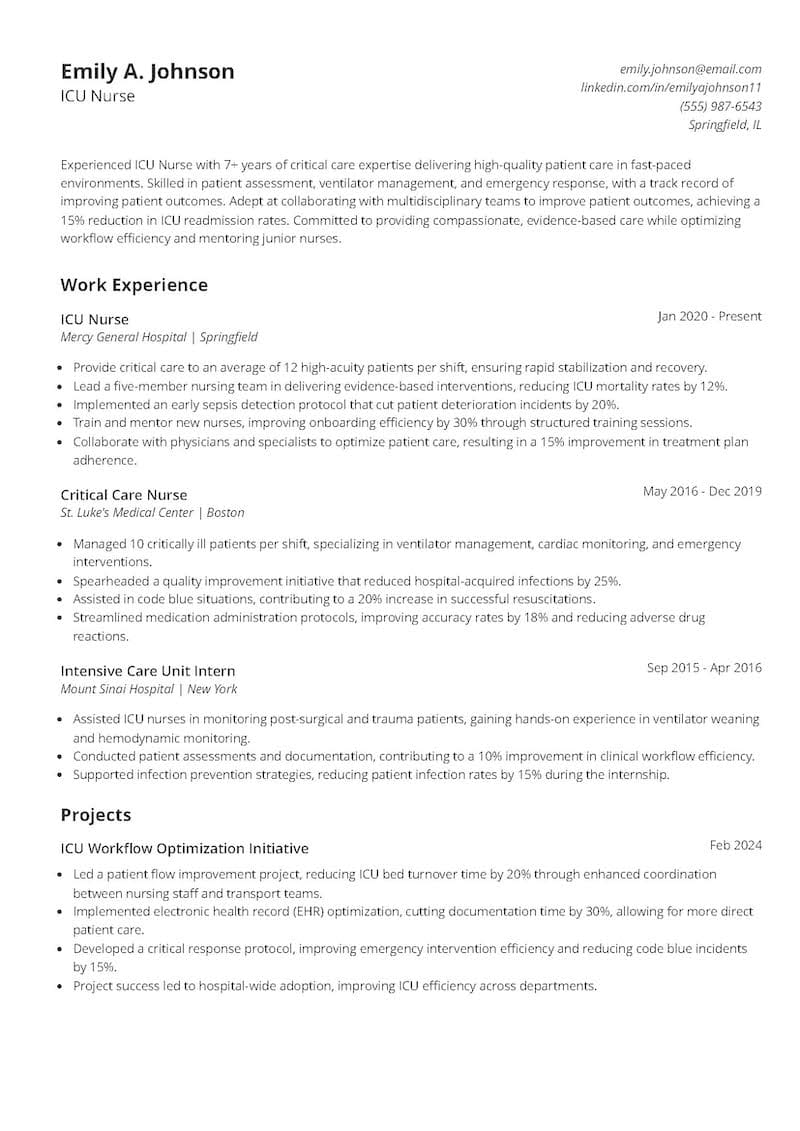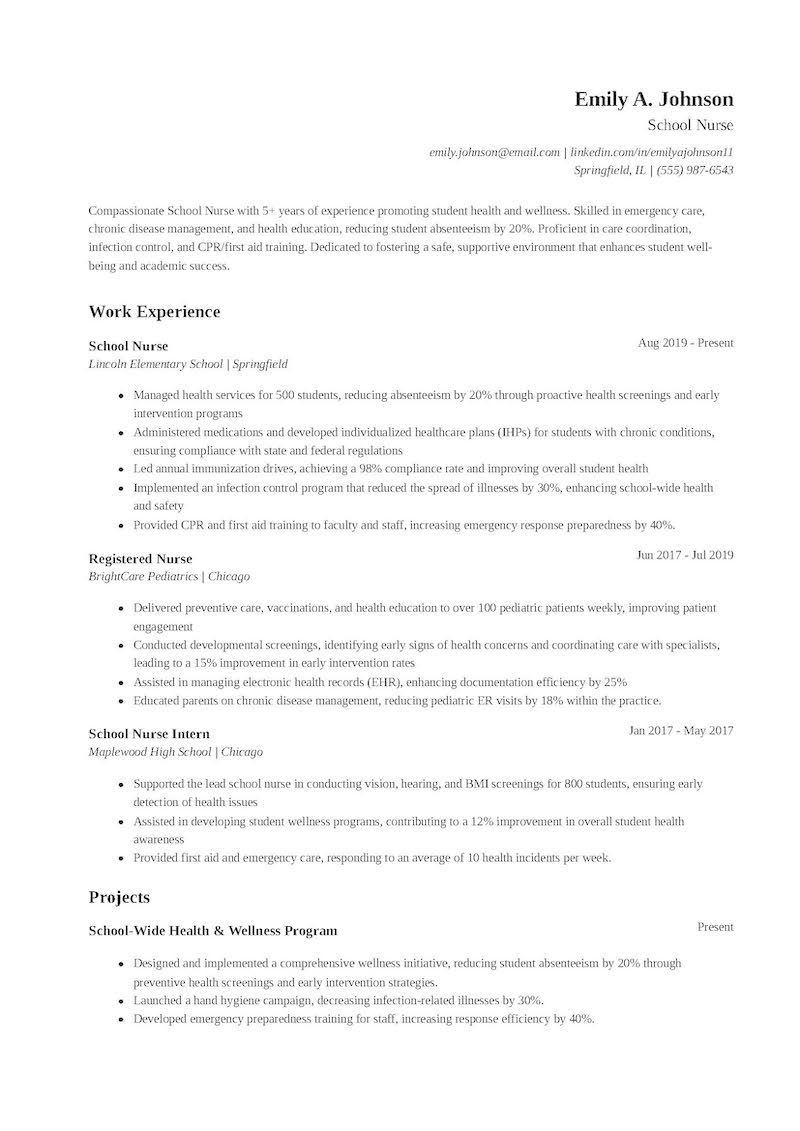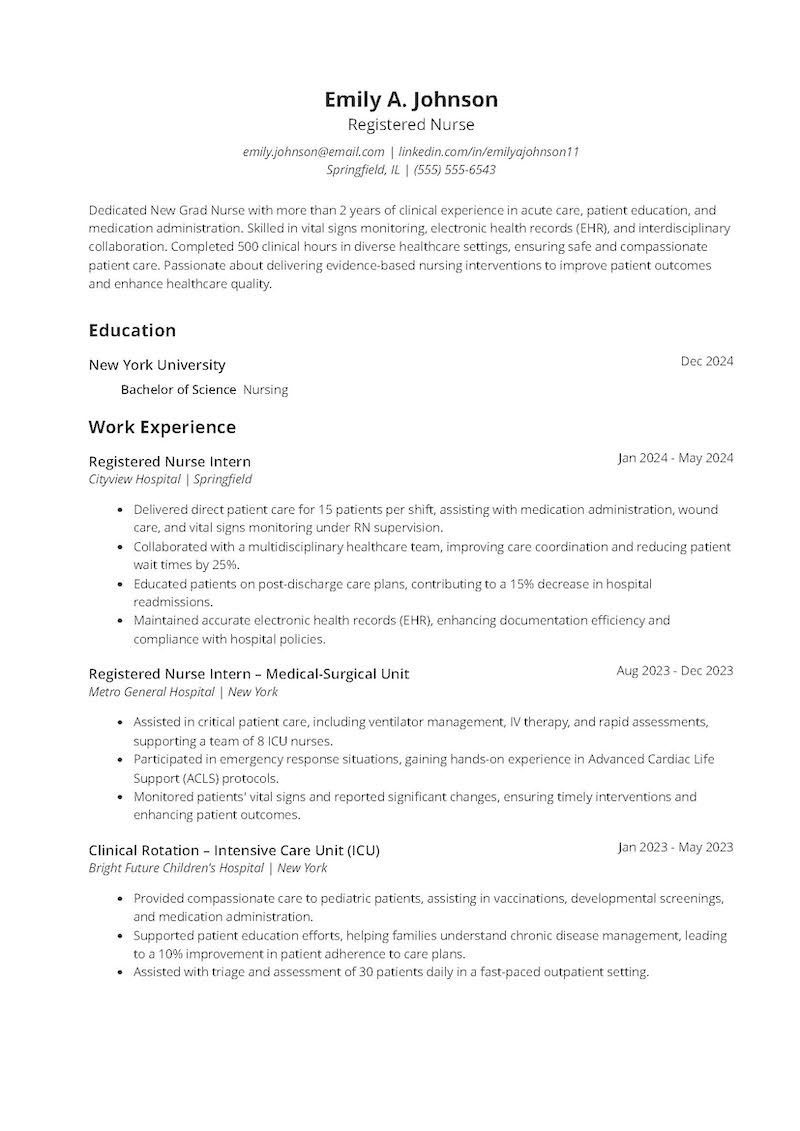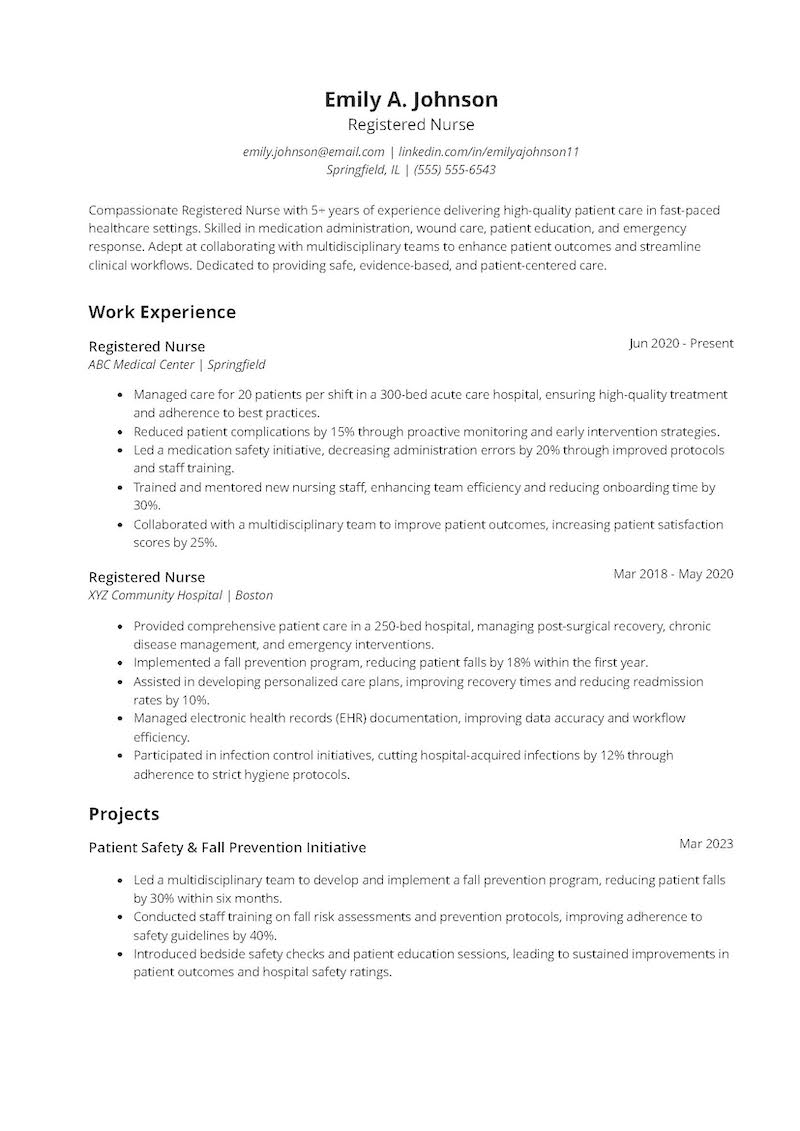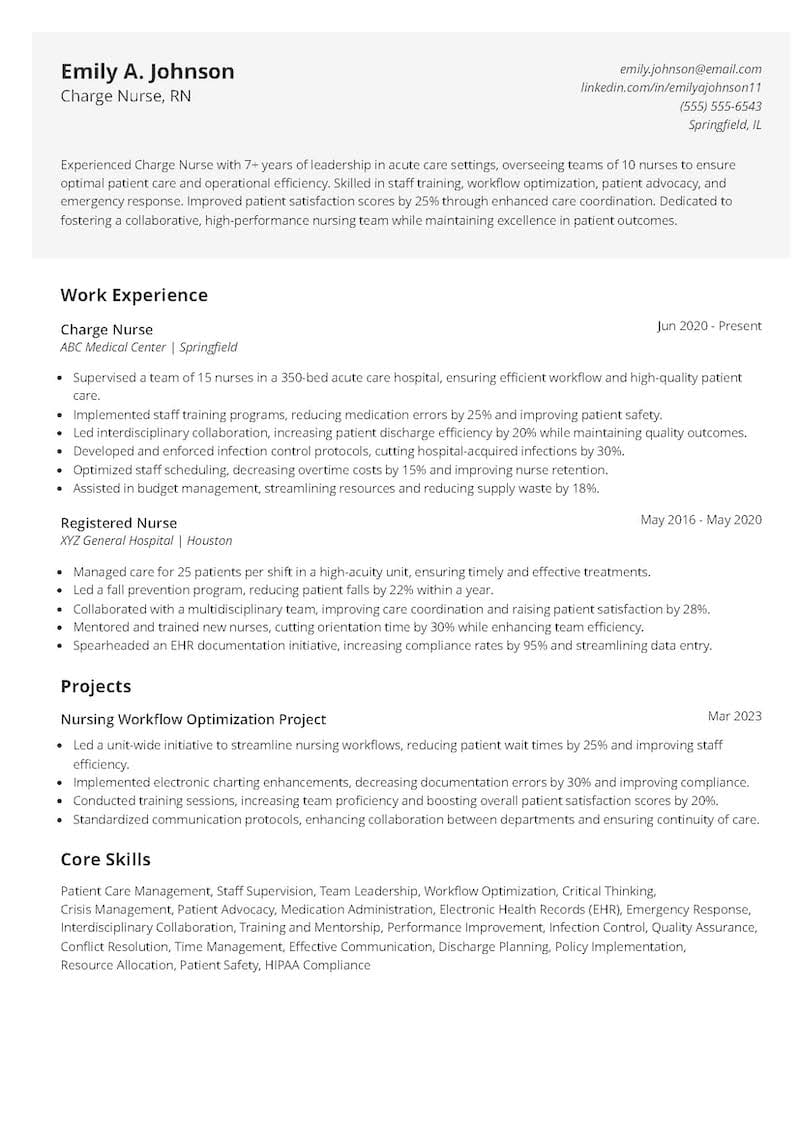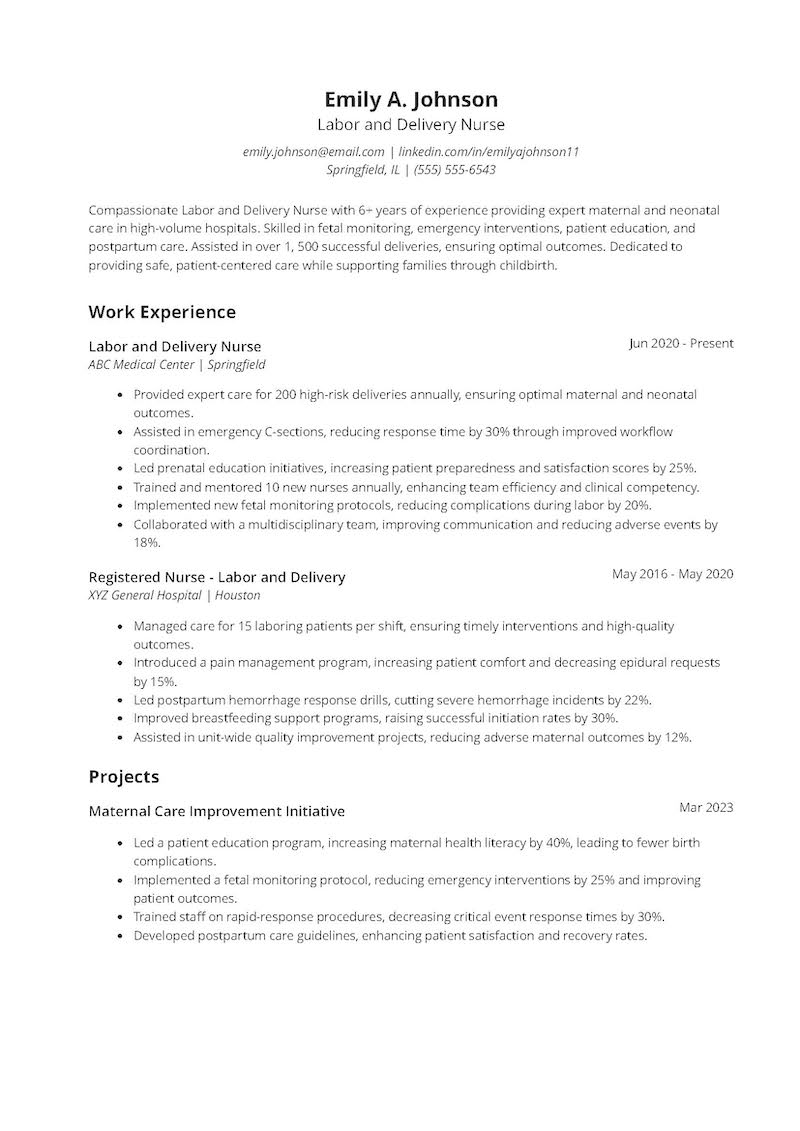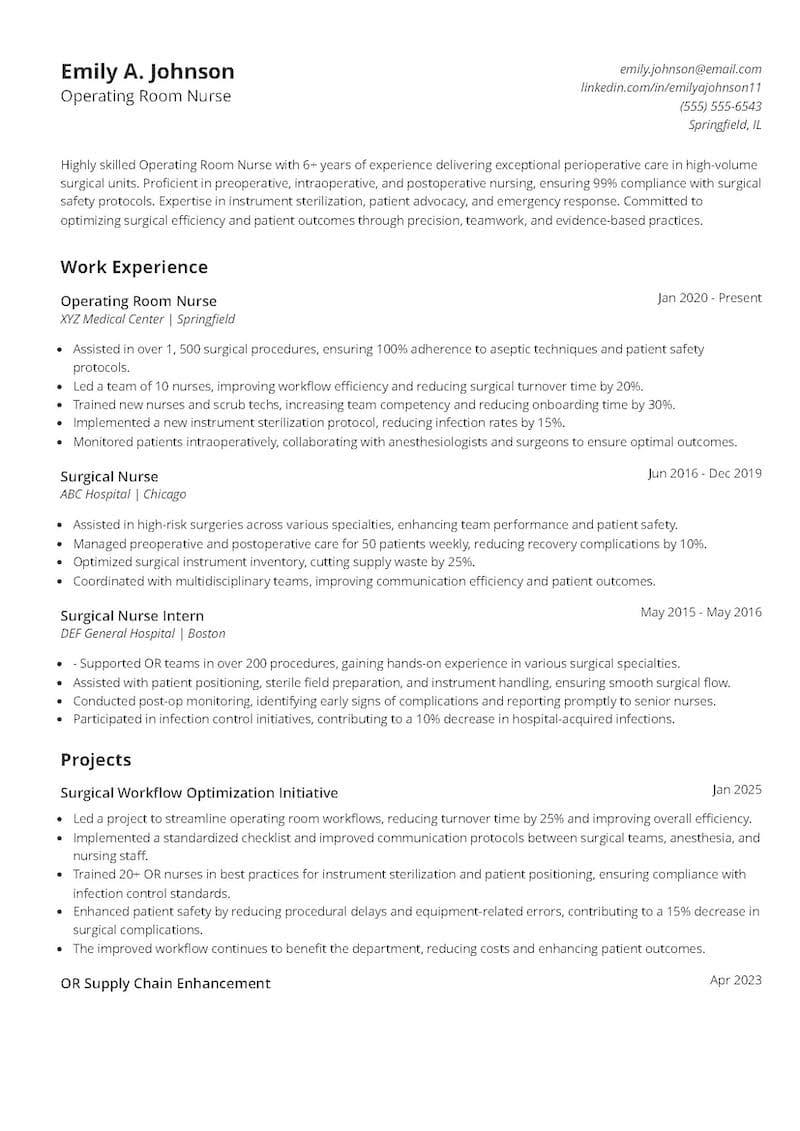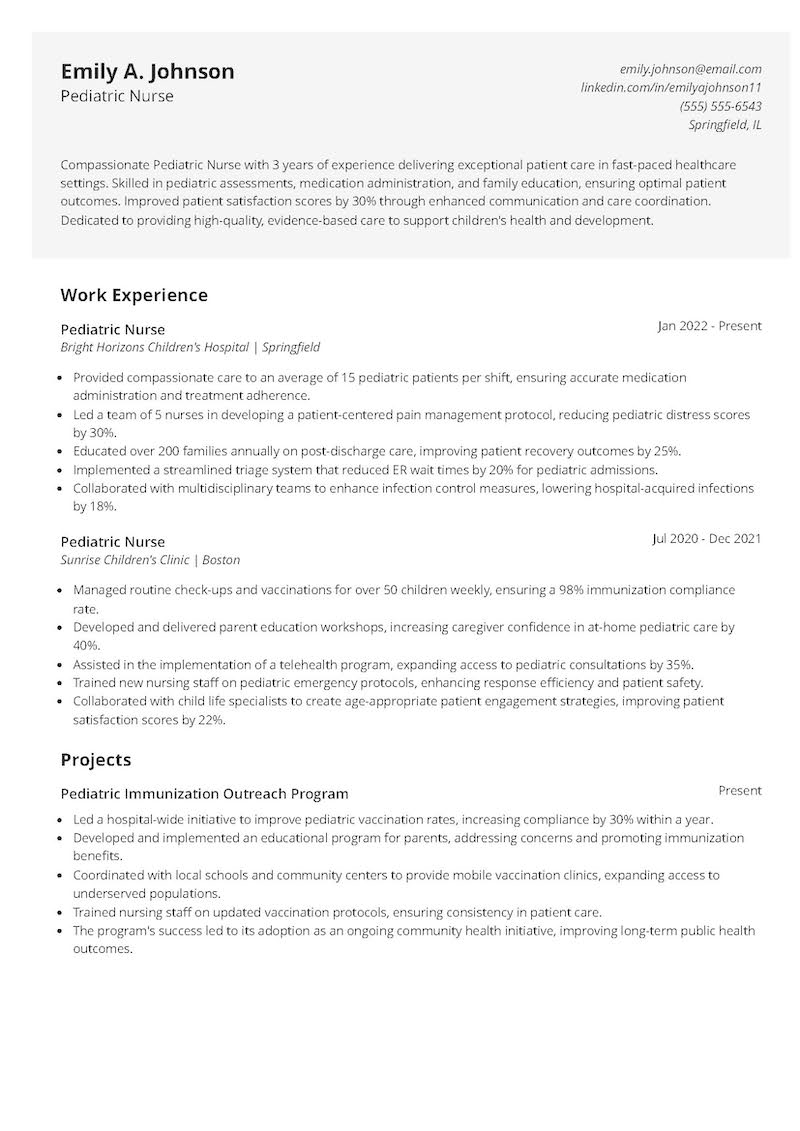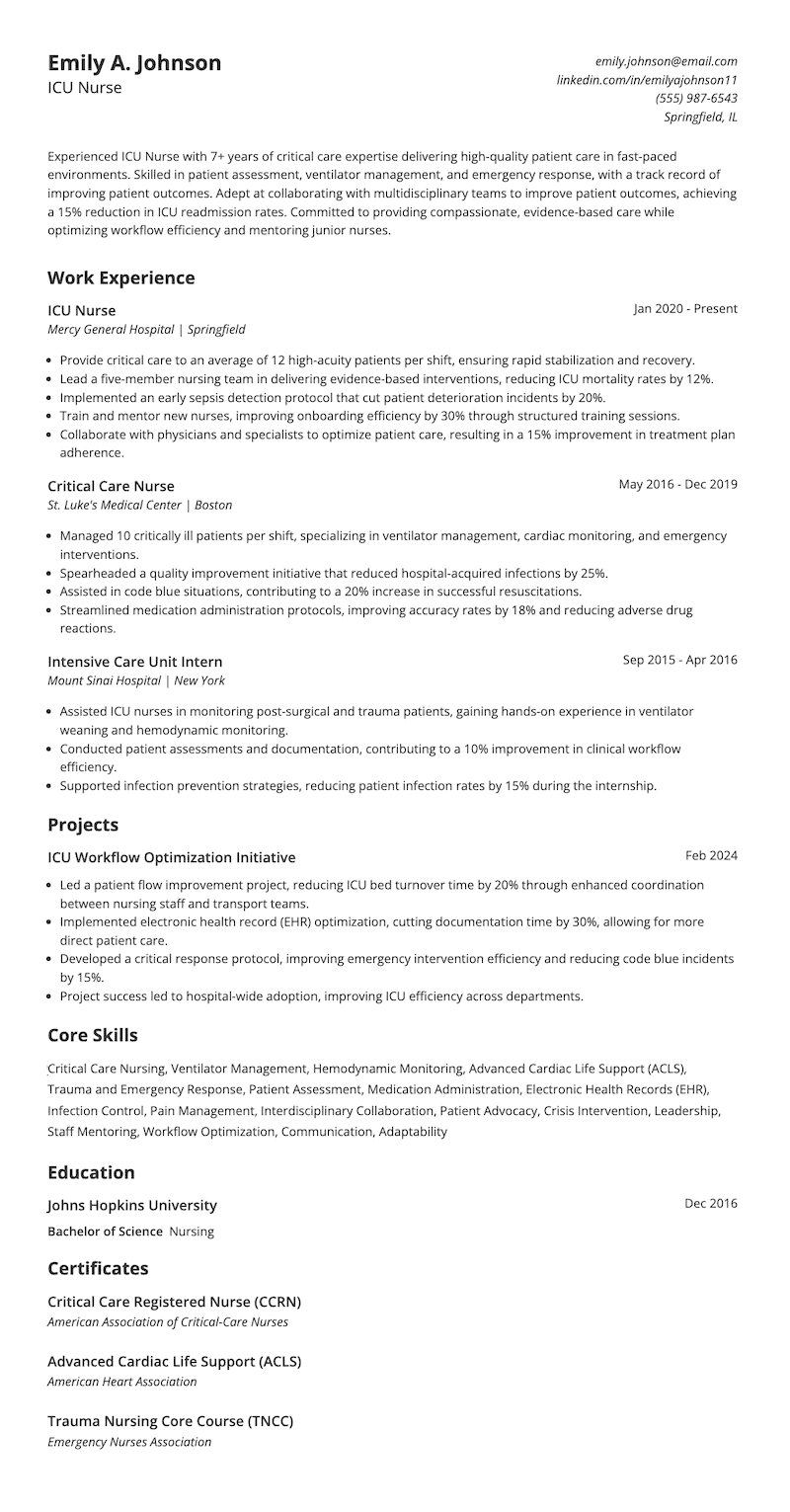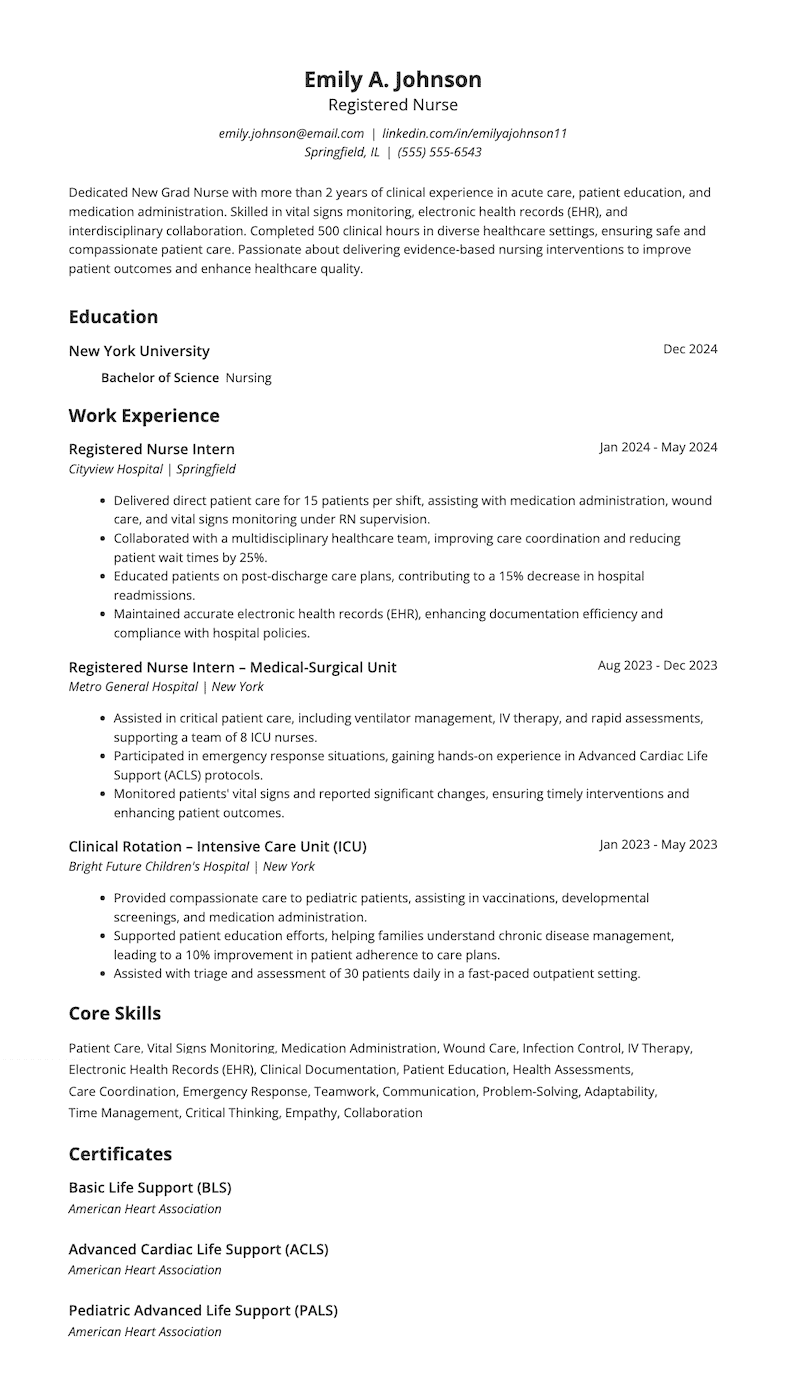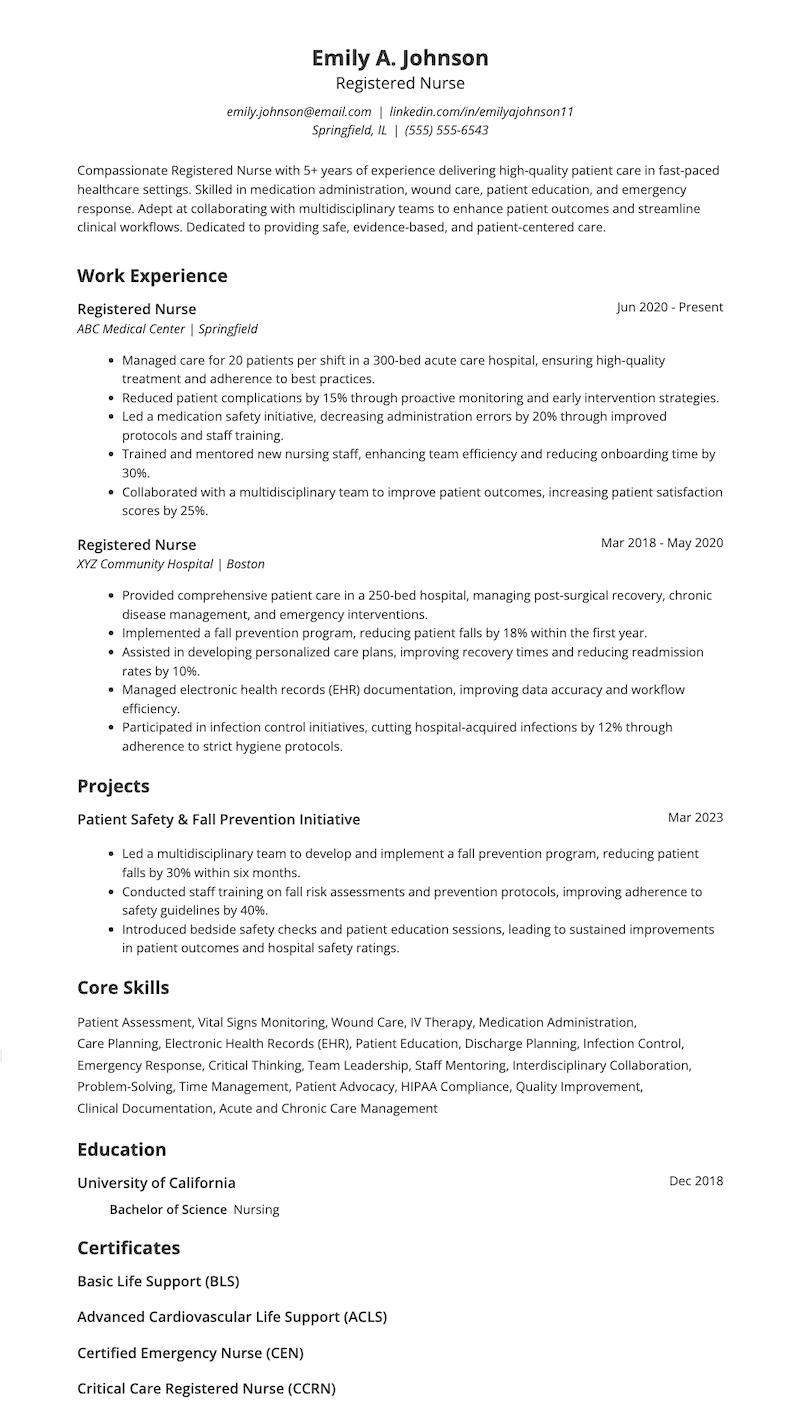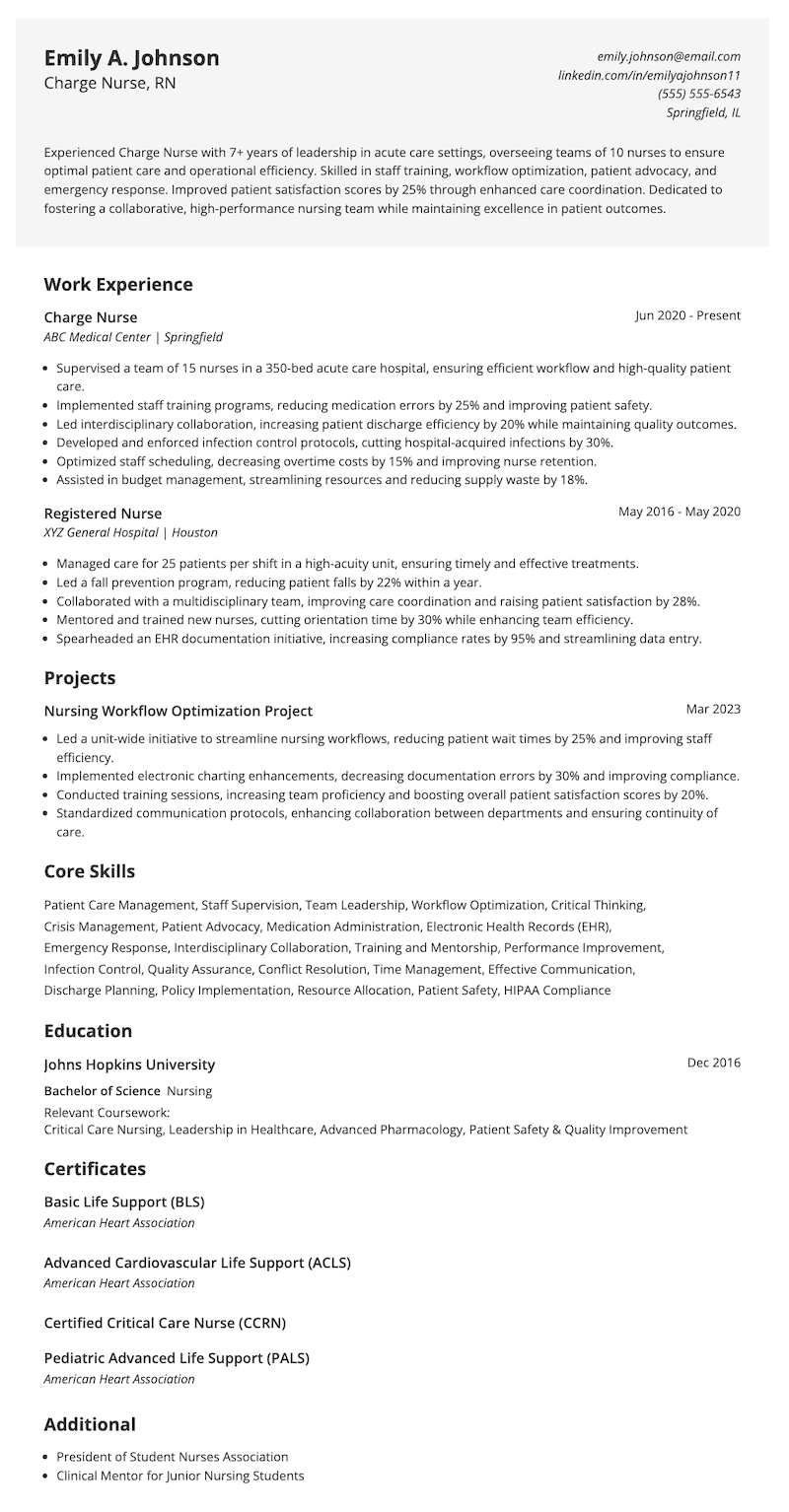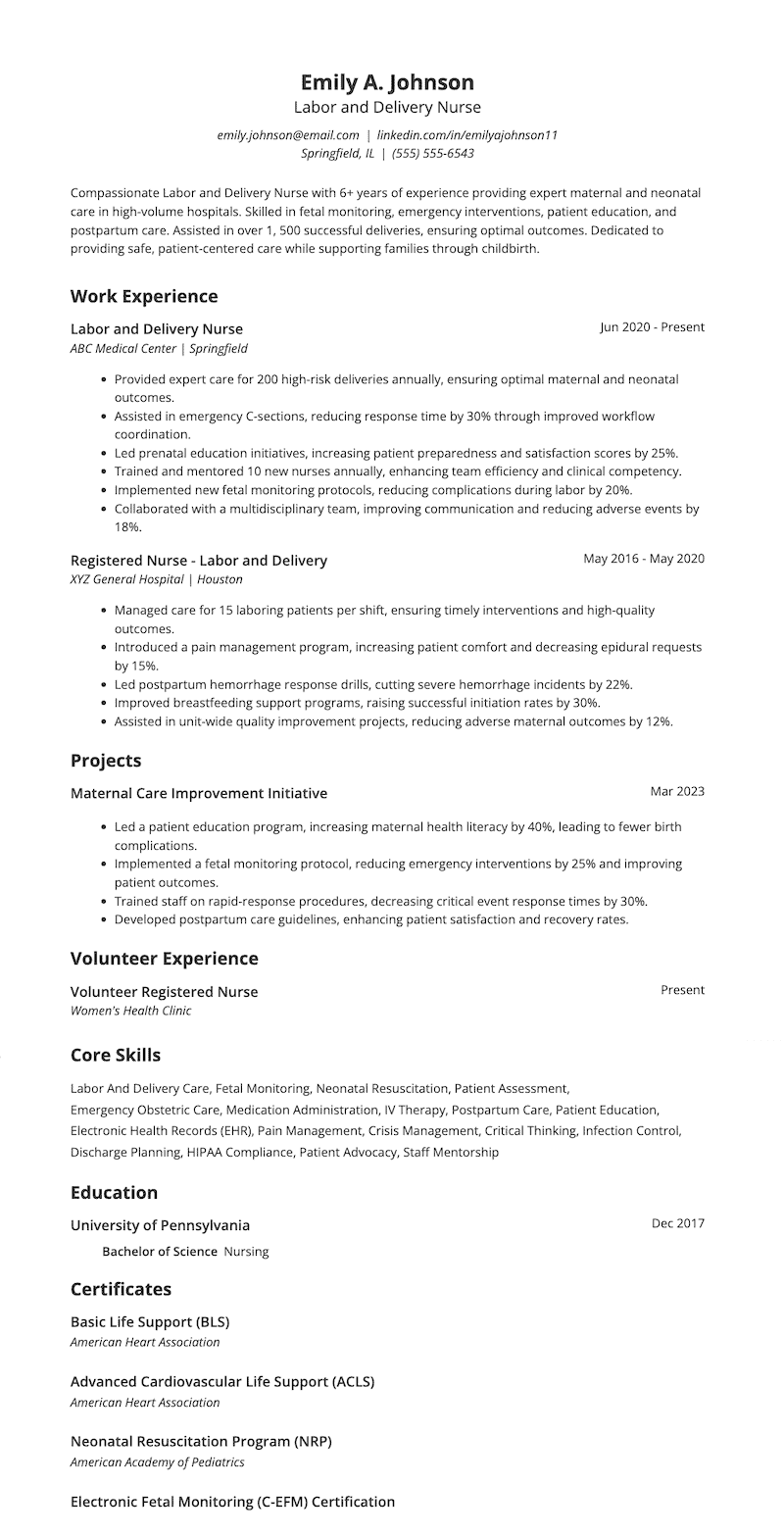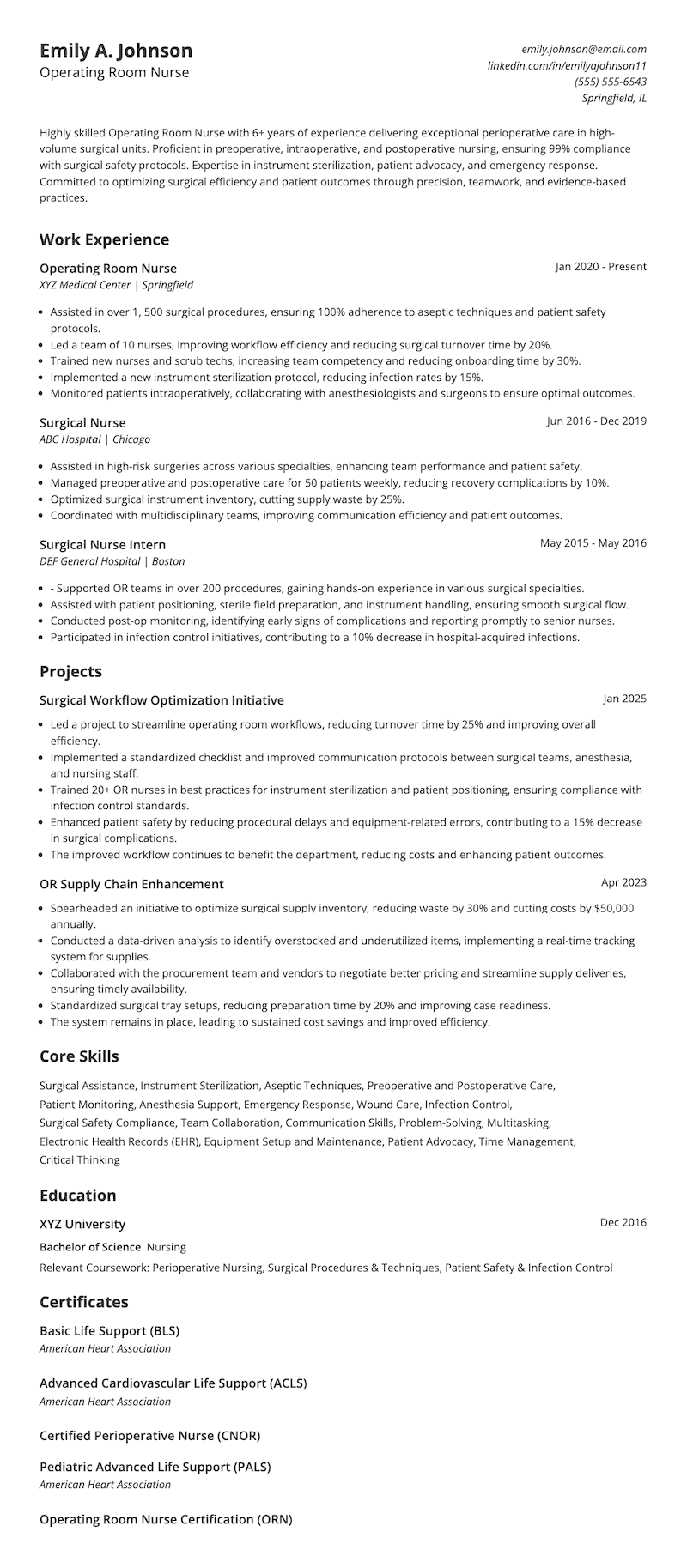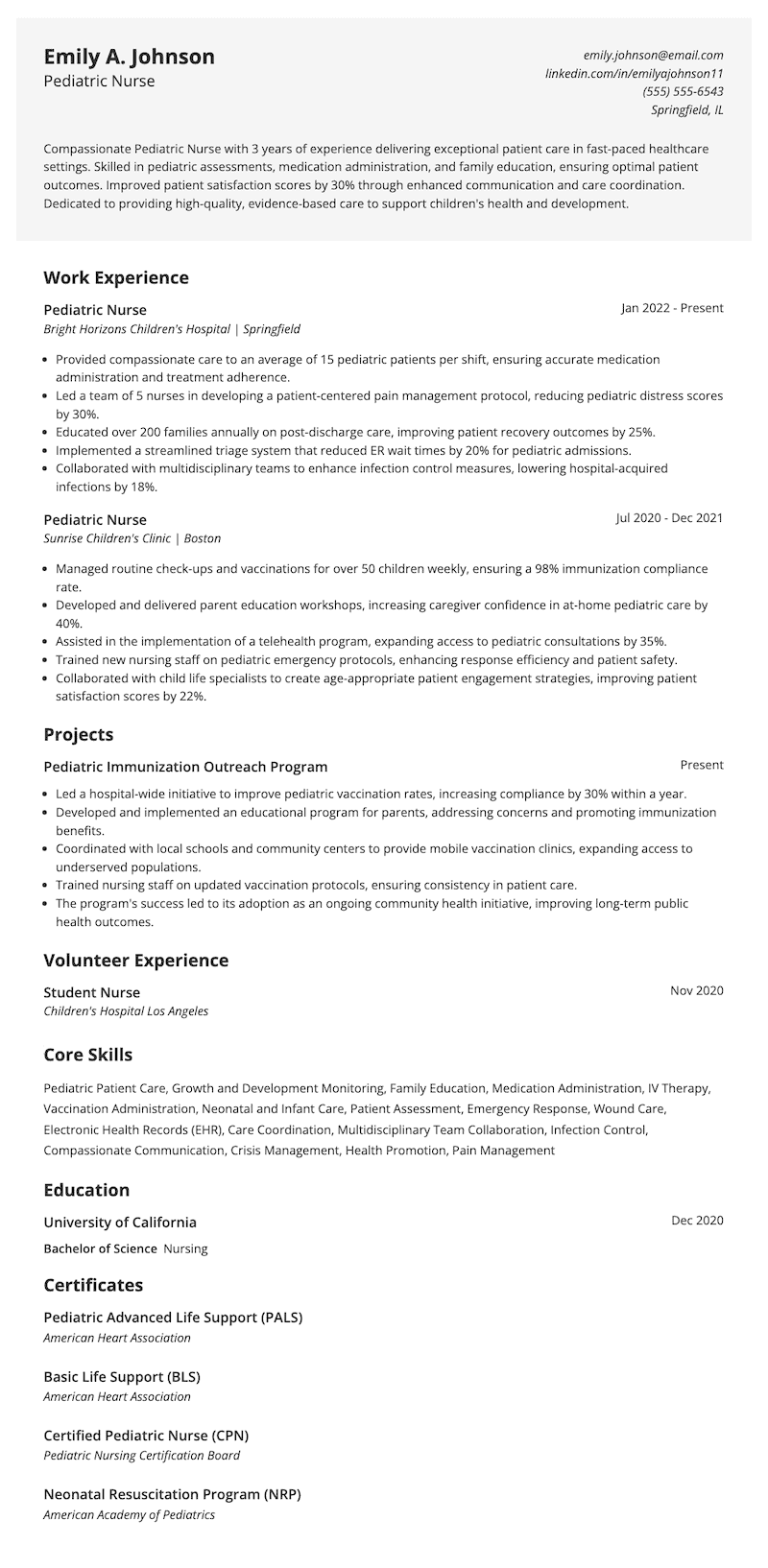Nursing Resume Examples & Tips for 2025
Looking for nursing resume inspiration? Get inspired by our nurse resume examples for 2025 and build a professional resume that highlights your skills and experience.

July 19, 2021

Registered nurses play a crucial role in patient care, making them indispensable in the healthcare industry. To help you land your ideal nursing job, this blog offers expertly designed resume samples and insider tips to showcase your clinical skills, experience, and adaptability effectively.
According to the Bureau of Labor Statistics, demand for registered nurses is projected to grow 6% by 2032. Employers seek candidates with strong patient care abilities, technical expertise, and the ability to thrive in fast-paced environments. A well-structured, ATS-friendly resume can be the key to securing top nursing roles.
Want to make sure your resume stands out? Keep reading to discover how to format your resume for maximum impact, optimize it for ATS, and highlight your nursing strengths in a way that grabs recruiters’ attention!
ICU nurse resume example
Are you an experienced ICU nurse looking for a job but unsure how to make your resume stand out? Check out this ICU Nurse resume example to see how you can effectively highlight your experience, certifications, and achievements.
ICU nursing requires strong clinical judgment, quick decision-making, and the ability to work in high-pressure situations. Potential employers look for candidates with experience in ventilator management, patient assessment, and emergency response. They also value teamwork, leadership, and a commitment to improving patient care. A well-structured resume that demonstrates these skills—along with measurable accomplishments—can help you land your next ICU nursing role.
This ICU nurse resume stands out because it effectively highlights both technical expertise and measurable achievements in critical care. It showcases several years of experience in high-acuity settings, emphasizing key skills like ventilator management, hemodynamic monitoring, and emergency response—all crucial for ICU nursing roles.
Additionally, the structured layout, clear headings, dedicated projects, certifications and education sections further reinforce leadership, innovation, and process improvement—qualities that set this candidate apart in the competitive field of critical care nursing.
School nurse resume example
Are you looking for a school nurse role but unsure how to make your resume stand out? Do you have the right experience but struggle to showcase it effectively? Take a look at this school nurse resume example, which highlights expertise, leadership, and measurable achievements to grab the attention of hiring managers.
A school nurse is expected to maintain student health and ensure a safe learning environment. Employers look for candidates with expertise in health screenings, chronic disease management, and emergency response. Strong communication skills, collaboration with parents and staff, and a commitment to infection control are essential.
This school nurse resume is highly effective because it combines measurable achievements, relevant certifications, and ATS-friendly keywords tailored to student healthcare. The structured format highlights key skills like chronic disease management, emergency care, and health education, which are essential in a school setting.
Strong, quantifiable results, such as reducing student absenteeism by 20% and improving emergency preparedness by 40%, demonstrate a direct impact. Additionally, the dedicated projects section showcases leadership in wellness initiatives, making this resume stand out in the field of school nursing.
New grad nurse resume example
Starting your nursing career? Your nurse resume is key to showcasing your clinical skills, patient care experience, and ability to work in the fast-paced healthcare industry. Below, we’ve provided a new graduate nurse resume template to help you create a strong application that highlights your qualifications and hands-on experience.
As a new grad nurse looking for your first job, your resume should emphasize clinical rotations, patient care skills, and certifications. Employers look for candidates with a solid foundation in medication administration, vital signs monitoring, and interdisciplinary teamwork. Highlight your ability to provide compassionate care, maintain accurate documentation, and adapt to different healthcare settings.
This resume is a great example for a new grad nurse as it demonstrates clinical experience, technical skills, and measurable contributions in various health care industries. The structured format ensures clarity and readability, with sections that emphasize 500+ clinical hours, key competencies like medication administration and patient education, and rotations in high-demand specialties such as ICU and pediatrics.
The inclusion of a strong educational background and professional certifications (BLS, ACLS, PALS) boosts credibility, while quantifiable results—like reducing patient wait times by 25%—demonstrate impact. This ATS-friendly resume positions a new graduate for success in competitive nursing roles.
Registered nurse resume example
If you are looking for a nurse resume that focuses on patient-centered care, teamwork, and clinical expertise? We’ve provided a strong registered nurse resume example to help you create a compelling application that highlights your qualifications and achievements. Check out and take inspiration now!
Registered nurses are expected to provide high-quality patient care, collaborate with medical teams, and ensure safety through best practices. Employers seek candidates with strong clinical skills, experience in patient education, and the ability to improve care processes. A well-structured resume that emphasizes hands-on experience, leadership, and measurable results can set you apart in this competitive field.
A well-balanced mix of clinical proficiency, patient safety initiatives, and leadership impact makes this registered nurse resume stand out. It highlights key competencies like medication administration, wound care, patient care, and emergency room response while integrating quantifiable achievements, such as reducing patient falls by 30% and increasing patient satisfaction scores by 25%.
The projects section reinforces expertise in quality improvement, and industry-recognized certifications (CCRN, CEN, ACLS, BLS) ensure credibility. This resume format effectively showcases both hands-on skills and strategic contributions to healthcare excellence.
Charge nurse resume example
If you’re aiming for a role where you can lead a nursing team while optimizing workflows but need help creating a strong Charge Nurse resume that stands out, check out our resume example below—it’s structured to highlight key achievements and leadership experience.
A great Charge Nurse resume should showcase leadership in staff supervision, patient care management, workflow optimization, and quality assurance. It must include measurable achievements, strong clinical expertise, and relevant certifications like BLS, ACLS, and CCRN. Highlighting process improvements, patient safety initiatives, and interdisciplinary collaboration will make your resume more compelling.
Strong leadership, measurable impact, and strategic workflow improvements define this charge nurse resume. It effectively highlights expertise in team supervision, patient care management, and interdisciplinary collaboration, reinforced by quantifiable results like a 25% reduction in medication errors, a 30% decrease in hospital-acquired infections, and a reduction in average length of stay.
The inclusion of workflow optimization projects and budget management achievements showcases operational efficiency. Industry-recognized certifications (CCRN, ACLS, PALS, BLS) further validate expertise, making this resume a compelling representation of leadership in acute care settings.
Labor and delivery nurse resume example
Do you want a labor and delivery nurse resume that sets you apart from the competition? Check out the example below—it showcases expertise in maternal and neonatal care, emergency interventions, and patient advocacy, all backed by measurable achievements.
Employers seek candidates with strong clinical skills, quick decision-making, and compassionate patient care. Hence, a labor and delivery nurse resume should highlight expertise in fetal monitoring, postpartum care, and emergency response while demonstrating leadership and teamwork.
The resume showcases a strong mix of clinical expertise, patient education, and leadership backed by measurable achievements. The use of numbers—like reducing complications by 20% and assisting in 1,500+ deliveries—adds credibility. Clear sections, relevant certifications, and impactful project details make it easy to scan. It’s structured to show both hands-on experience and contributions to team efficiency and patient outcomes.
Operating room nurse resume example
If you want to showcase your ability to assist in surgeries, maintain strict sterilization protocols, and ensure patient safety at every stage as an operating room nurse? This resume is a great example of how to highlight surgical expertise, leadership, and process improvement, making it an excellent reference for your own application.
The role of an OR Nurse requires strong clinical skills, attention to detail, and the ability to thrive in a fast-paced environment. Employers look for candidates who can assist in surgeries, collaborate with teams, and maintain strict safety standards. Certifications, efficiency improvements, and patient advocacy all help candidates stand out.
This resume highlights hands-on experience, leadership, and process improvement. It showcases expertise in perioperative care, surgical assistance, and infection control, backed by proven leadership in workflow optimization and supply chain management. Strong metrics—such as a 25% reduction in OR turnover time and a 15% decrease in surgical complications—highlight process improvements.
Industry-recognized certifications reinforce professional credibility, while structured projects and leadership roles emphasize the ability to enhance surgical team performance and patient outcomes.
Employers will appreciate the clear structure, strong action verbs, and evidence of teamwork, making it easy to see the candidate’s value in a fast-paced surgical environment.
Pediatric nurse resume example
Are you looking to build a rewarding career in pediatric nursing? Check out this strong resume example, which highlights essential skills, hands-on experience, and measurable achievements in pediatric care.
Pediatric nurses must be skilled in patient assessments, family education, and emergency response while providing compassionate care. Employers look for candidates with strong clinical knowledge, teamwork abilities, and a commitment to improving patient outcomes.
This pediatric nurse resume showcases a powerful blend of clinical expertise, patient advocacy, and process improvement. Strong metrics—such as a 30% increase in patient satisfaction and a 25% boost in recovery outcomes—highlight the ability to deliver high-quality, family-centered care.
Specialized skills in neonatal care, immunization outreach, and emergency response reinforce a commitment to children’s health. Relevant certifications (CPN, PALS, NRP) and leadership in education initiatives make this resume highly appealing to pediatric healthcare employers.
How to write a nursing resume that will get you an interview
With the rise in demand for nurses, simply listing your nursing experience isn’t enough—you need a resume that’s ATS-friendly to get noticed. Applicant Tracking Systems (ATS) operates like search engines used by many hospitals and healthcare facilities to manage the hiring process. That means if your resume isn’t optimized for ATS, it may never be seen, no matter how qualified you are.
If a hospital is hiring for a nursing position, recruiters may search for keywords like “patient care,” “clinical expertise,” and “critical thinking,” which are essential in a clinical setting. If your resume includes these terms, it has a better chance of getting noticed. Without them, it could be filtered out before reaching a hiring manager.
How ATS works:
- Job posting setup: The hiring team enters essential details such as job title, required skills, and qualifications into the applicant tracking system (ATS).
- Resume scanning: The ATS scans submitted resumes, extracting key information.
- Searchable database: All scanned resumes are stored in a searchable database, allowing recruiters to find candidates through keyword searches.
Want to ensure your resume passes the ATS and gets in front of recruiters? Try Jobscan’s Free Resume Builder. It helps you create an optimized, ATS-friendly resume in minutes and ensures your resume meets industry standards—all for free!
Scan your nursing resume
Use Jobscan's resume scanner to ensure your nursing resume is ATS-friendly and includes all the necessary keywords from the job description.
Optimize your resume
1. Key elements of a nursing resume
A well-structured nurse resume is essential for making a strong first impression and increasing your chances of landing an interview. The first thing to consider is the key elements every nurse resume should include to highlight your career goals:
- Contact information: Full name, phone number, professional email address, and LinkedIn profile (if applicable).
- Professional summary: A concise overview highlighting years of experience, key skills, and unique value to employers.
- Core skills: A keyword-rich section listing both technical and soft skills relevant to nursing.
- Professional experience section: Job roles in reverse chronological order, emphasizing accomplishments and career progression, patient care impact, and quantifiable results.
- Education: Degree earned, institution name, graduation year, and any relevant coursework or honors.
- Certifications & licenses: Essential nursing certifications such as RN license, BLS, ACLS, PALS, or specialty credentials.
- Projects & achievements: Notable initiatives led, process improvements, or patient care enhancements with measurable outcomes.
2. Write a strong professional summary
A strong summary highlights your experience, key skills, and unique value, making a lasting impression. It must be compelling, concise, and tailored to the specific job, helping you stand out in the job market.
Here’s an example of a good and bad professional summary:
Good examples of a resume summary
- “Compassionate and detail-oriented Registered Nurse with 6+ years of experience in critical care and emergency settings. Skilled in patient assessment, medication administration, and team leadership. Proven ability to improve patient outcomes and streamline workflows, reducing ER wait times by 20%. Dedicated to delivering high-quality, patient-centered care.”
- “Dedicated and highly skilled Registered Nurse with 8+ years of experience in acute care and surgical units. Adept at patient advocacy, wound care, and collaborating with multidisciplinary teams to ensure optimal health outcomes. Successfully implemented a patient education program that reduced post-surgical complications by 25%. Passionate about delivering compassionate, evidence-based care in high-pressure environments.”
Bad examples of a resume summary
- “I am a hardworking nurse who loves helping people. I have some experience working in hospitals and know how to take care of patients. A great way to utilize my skills would be in a job where I can use my skills and learn more about nursing.”
- “I am a friendly and caring nurse who enjoys working with patients. I have worked in different hospital departments and am good at helping doctors and other nurses. I always do my best to take care of patients and hope to grow in my career.”
Let Jobscan’s Summary Generator take the guesswork out of writing a professional summary by helping you create a compelling, ATS-friendly statement tailored to your nursing experience. Simply input your details, and Jobscan will generate a polished, keyword-optimized summary that grabs recruiters’ attention!
3. Demonstrate key nursing skills
A strong nurse resume should highlight a mix of hard and soft skills to showcase your expertise and ability to provide excellent patient care, demonstrating why you’re a good fit for the job. Here are some key skills to consider that appeal to hiring managers and ATS software:
Hard skills
- Patient Assessment
- Patient Care Plans
- Medication Administration
- IV Insertion & Management
- Wound Care & Dressing Changes
- Electronic Medical Records (EMR)
- Electronic Health Records (EHR)
- Vital Signs Monitoring
- Infection Control Protocols
- Emergency Response & Triage
- Diagnostic Testing Assistance
- Patient & Family Education
Soft skills
- Active Listening
- Critical Thinking & Problem-Solving
- Time Management
- Adaptability & Stress Management
- Teamwork & Collaboration
- Leadership & Decision-Making
- Attention to Detail
- Conflict Resolution
- Cultural Competency
Integrating these skills into your bullet points can help you show off your accomplishments and highlight your proficiencies. But there’s a right and wrong way to highlight your nursing skills in your bullet points.
4. Craft impactful resume bullet points for nurses
Resume bullet points are the core of your experience section. They should clearly communicate your skills, the impact you’ve made, and the value you bring to a team. Instead of listing tasks, focus on what you accomplished using specific tools, action verbs, and measurable results. Here’s what that looks like:
Good examples of resume bullet points
- “Administered medications to an average of 20 patients per shift, ensuring 100% adherence to safety protocols.”
- “Led a team of 5 nurses, improving workflow efficiency and reducing patient wait times by 25%.”
- “Implemented a new infection control protocol, reducing hospital-acquired infections by 15%.”
- “Educated 100+ patients and families monthly on post-operative care, improving recovery outcomes.”
- “Collaborated with a multidisciplinary team to develop a pain management strategy, reducing patient discomfort scores by 30%.”
Bad examples of resume bullet points
- “Gave medicine to patients.”
- “Helped doctors and other nurses with different tasks.”
- “I worked with a lot of patients every day.”
- “Took care of patient needs and provided support.”
- “Responsible for checking vital signs.”
Leverage Jobscan’s Bullet Point Generator to craft impactful, results-oriented resume bullet points. Simply upload your resume and the job description to your Jobscan dashboard, and the tool will provide customized phrase suggestions that showcase your skills and accomplishments effectively.
5. Highlight your achievements as a nurse
Recruiters want to see more than just your daily responsibilities—they want to know how you’ve made an impact. Highlighting your achievements with measurable results helps your resume stand out. Instead of listing duties, focus on specific contributions and improvements you made in patient care, team efficiency, or hospital operations.
Here’s how you can highlight your achievements:
- “Reduced patient wait times by 30% by implementing a new triage system in collaboration with the care team, which positively impacted the number of patients served.”
- “Trained and mentored 15+ new nurses, improving overall team performance.”
- “Managed a 20-bed unit, ensuring seamless patient care and workflow efficiency.”
6. Tailor your resume to the job description
Submitting the same resume for every job might seem like a time-saver, but it could be costing you interviews. A tailored resume increases your chances of passing the ATS and catching a hiring manager’s attention.
Here’s how to tailor your resume to the job description:
- Analyze the job description: Identify key skills, qualifications, and responsibilities listed.
- Use the right keywords strategically: Incorporate relevant terms naturally into your professional summary, skills, and experience sections.
- Highlight matching experience: Focus on duties and achievements that directly align with the job posting.
- Customize your professional summary: Briefly showcase how your experience fits the specific role.
- Adjust bullet points: Emphasize accomplishments that reflect the employer’s needs.
- ATS optimization: Stick to clean formatting, standard fonts, and avoid images to ensure your resume is easily readable by ATS.
7. Include relevant education and certifications
Your education and certifications show employers that you have the necessary knowledge and training for the role.
Here’s how to do it effectively:
- Include your degree, major, and institution in a concise format (e.g., Bachelor of Science in Nursing (BSN), ABC University).
- For recent graduates, add your graduation year and relevant coursework, such as pharmacology, patient care, or critical care nursing.
- For experienced professionals, keep it brief and focus on higher education degrees.
- If switching careers, highlight coursework or degrees that relate to your new industry.
- List key nursing certifications that demonstrate commitment to patient safety and professional growth (e.g., Certified Critical Care Nurse (CCRN), Basic Life Support (BLS), Advanced Cardiovascular Life Support (ACLS)).
- If specializing in a nursing field, include certifications relevant to that specialty, such as Oncology Certified Nurse (OCN) or Certified Emergency Nurse (CEN).
- For highly experienced professionals, focus on industry-recognized certifications rather than listing all past training programs.
Top nursing certifications
Here are the top nursing certifications that can enhance your resume:
- RN (Registered Nurse)
- BLS (Basic Life Support)
- ACLS (Advanced Cardiovascular Life Support)
- CCRN (Critical Care Registered Nurse)
Nursing resume tips
A well-structured resume can be the key to landing your next nursing job. Apply these tips to make your application stand out and increase your chances of getting an interview.
- Keep it ATS-friendly: Use simple formatting, clear headings, and incorporate relevant keywords from the job description to pass Applicant Tracking Systems (ATS).
- Highlight key skills and certifications: Emphasize essential nursing skills, technical expertise, and certifications like BLS, ACLS, and PALS to showcase qualifications.
- Tailor your resume to the job: Customize your resume for each position by aligning your experience, skills, and summary with the job description.
- Use action verbs: Start bullet points with strong action verbs like “administered,” “coordinated,” or “implemented” to create a dynamic and engaging resume.
- Keep it concise: Aim for a one-page resume if you have less than 10 years of experience. Keep descriptions focused and impactful.
- Proofread for errors: Typos and grammar mistakes can make a bad impression. Double-check your resume or use tools like Jobscan to ensure it’s polished and optimized.
Include a cover letter with your nursing resume
A well-crafted cover letter can set you apart from other nursing candidates by showcasing your passion for patient care and highlighting key experiences that align with the job. While your resume lists your skills and qualifications, a cover letter allows you to personalize your application and explain why you’re the perfect fit for the role.
What to include in your nursing cover letter:
- A strong opening: Mention the specific position you’re applying for and express enthusiasm for the opportunity.
- Relevant experience: Highlight key nursing skills and experiences that align with the job description.
- Patient-centered approach: Emphasize your commitment to providing high-quality care.
- A compelling closing: End with a confident statement about your qualifications and a request for an interview.
Use Jobscan’s Cover Letter Generator to create a compelling, ATS-friendly cover letter that complements your resume and grabs the hiring manager’s attention!
Nail your next nursing job application with a perfect resume
An optimized resume can help you stand out in a competitive job market and get noticed by hiring managers. Take inspiration from our nursing resume examples to create a strong, ATS-friendly, competitive nursing resume and get one step closer to landing your dream job.
Ready to take the next step in your nursing career? Jobscan provides a range of AI-driven tools to improve your job search. Its features, including the Resume Scanner, One-Click Optimize, and LinkedIn Optimization, analyze your resume against job descriptions to ensure compatibility with Applicant Tracking Systems (ATS) and recruiter expectations. By detecting missing keywords and formatting issues, Jobscan enables you to refine your application for each role, boosting your chances of securing interviews.

Nursing common interview questions
“I’ve always been drawn to helping people, and nursing felt like the perfect combination of science and compassion. I love that every day is different, and I get to be there for patients and their families during some of their most vulnerable moments.”
“I once had a patient who was very anxious and refused medication. Instead of pushing, I took the time to listen to their concerns and explain the benefits and potential side effects. After building trust, they felt more comfortable and agreed to treatment.”
“I admire this hospital’s commitment to patient-centered care and innovation. I’ve heard great things about teamwork and leadership here, and I’d love to contribute my skills while continuing to grow as a nurse.”
“I’m a strong communicator, and I pride myself on my ability to stay calm under pressure. I also have excellent critical thinking skills, which help me assess situations quickly and provide the best care possible.”
“I tend to take on a lot because I want to help everyone. I’ve learned to set boundaries and prioritize tasks more effectively, ensuring I provide the best care without overwhelming myself.”
“Yes! Can you tell me more about the team I’d be working with? Also, what are some challenges nurses in this unit typically face?”
Nursing resume frequently asked questions
Include clinical skills like patient care, medication administration, and wound care, along with soft skills like communication, teamwork, and adaptability. Also, highlight certifications, EHR proficiency, and critical thinking abilities.
List your degree, school name, location, and graduation year. Mention relevant coursework, honors, and clinical rotations if applicable. Add certifications like BLS, ACLS, or specialty credentials to strengthen your qualifications.
Focus on clinical rotations, internships, and transferable skills like patient communication and problem-solving. Highlight education, certifications, and volunteer work in healthcare settings. Use a strong summary and core skills section to showcase your strengths and expertise.
